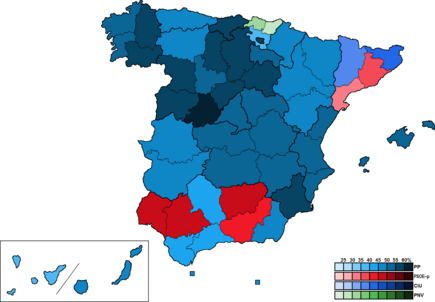Spanish legislative election, 2000
|
|
|||||||||||||||||||||||||||||||||||||||||||||||||||||||||||||||||||||||||||||||||||||||||||||||||||||
|---|---|---|---|---|---|---|---|---|---|---|---|---|---|---|---|---|---|---|---|---|---|---|---|---|---|---|---|---|---|---|---|---|---|---|---|---|---|---|---|---|---|---|---|---|---|---|---|---|---|---|---|---|---|---|---|---|---|---|---|---|---|---|---|---|---|---|---|---|---|---|---|---|---|---|---|---|---|---|---|---|---|---|---|---|---|---|---|---|---|---|---|---|---|---|---|---|---|---|---|---|---|
|
|||||||||||||||||||||||||||||||||||||||||||||||||||||||||||||||||||||||||||||||||||||||||||||||||||||
|
All 350 seats in the Congress of Deputies and 208 (of 259) seats in the Senate 176 seats needed for a majority in the Congress of Deputies |
|||||||||||||||||||||||||||||||||||||||||||||||||||||||||||||||||||||||||||||||||||||||||||||||||||||
| Opinion polls | |||||||||||||||||||||||||||||||||||||||||||||||||||||||||||||||||||||||||||||||||||||||||||||||||||||
| Registered | 33,969,640 |
||||||||||||||||||||||||||||||||||||||||||||||||||||||||||||||||||||||||||||||||||||||||||||||||||||
| Turnout | 23,339,490 (68.7%) |
||||||||||||||||||||||||||||||||||||||||||||||||||||||||||||||||||||||||||||||||||||||||||||||||||||
|
|||||||||||||||||||||||||||||||||||||||||||||||||||||||||||||||||||||||||||||||||||||||||||||||||||||

Constituency results map for the Congress of Deputies
|
|||||||||||||||||||||||||||||||||||||||||||||||||||||||||||||||||||||||||||||||||||||||||||||||||||||
|
|||||||||||||||||||||||||||||||||||||||||||||||||||||||||||||||||||||||||||||||||||||||||||||||||||||
The 2000 Spanish general election was held on Sunday, 12 March 2000, to elect the 7th Cortes Generales of the Kingdom of Spain. All 350 seats in the Congress of Deputies were up for election, as well as 208 of 259 seats in the Senate.
While most opinion polls gave him a clear victory, the incumbent People's Party of Prime Minister José María Aznar was elected to a second term in office with a surprising absolute majority of 183: a 27-seat gain from the previous election: a rise from opinion polls which gave him a plurality victory only. The opposition Spanish Socialist Workers' Party saw their number of seats reduced to 125, one of its worst results ever. While neither one of its worst defeats since Spanish transition to democracy (it lost more seats in the 1986 election, losing 18; and a similar number of seats were lost in 1996, with 16) nor the party's worst electoral result ever since (winning 118 and 121 seats in 1977 and 1979, respectively) the party's result in these elections quickly became known as Almunia's defeat, a psychological barrier for the PSOE in future elections; a result which would be vastly exceeded 11 years later.
This election featured some notable aspects. This was the first absolute majority the PP obtained in a general election, and its best result in both popular vote share and seats won until 2011. In contrast, the PSOE got its worst election result in 21 years. This was also the second time a candidate received more than 10 million votes, the last time being in 1982, when 10.1 million voters elected Felipe González from the PSOE. The voters' turnout registered was one of the lowest in democratic Spain for Spanish election standards (which tend to be usually high), with only 68.71% of the voting-able population casting a vote.
...
Wikipedia






